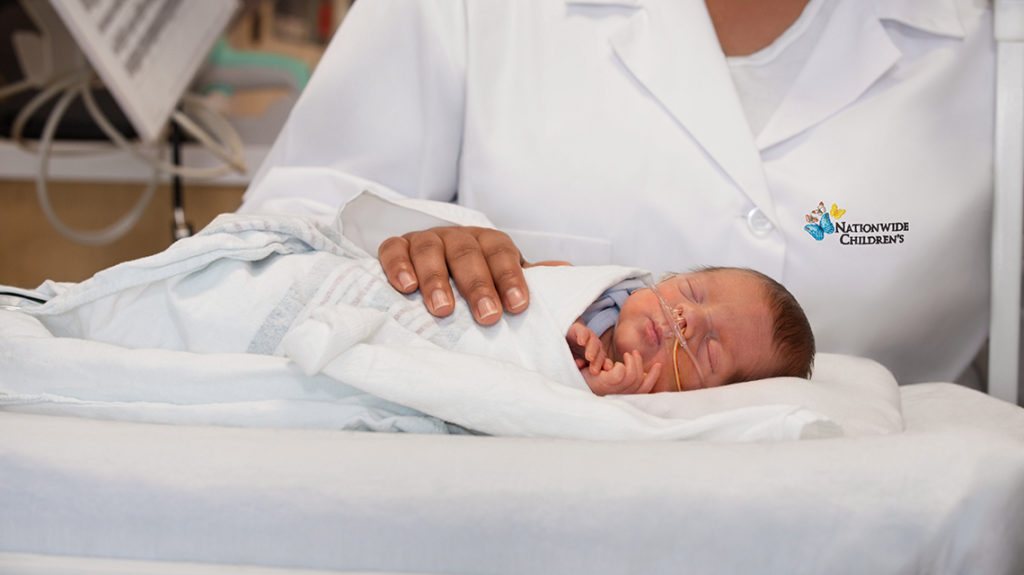Ensuring Vulnerable Babies Receive the Benefits of Human Milk
Ensuring Vulnerable Babies Receive the Benefits of Human Milk https://pediatricsnationwide.org/wp-content/uploads/2021/01/013019BS2257_c._header-1024x575.jpg 1024 575 Mary Bates, PhD Mary Bates, PhD https://secure.gravatar.com/avatar/c6233ca2b7754ab7c4c820e14eb518c8?s=96&d=mm&r=g- October 06, 2023
- Mary Bates, PhD

A QI project increases human milk consumption among newborns hospitalized with congenital heart disease.
The American Academy of Pediatrics and the World Health Organization recommend human milk for infants because of its important health benefits. However, most newborns with congenital heart disease (CHD) are separated from their mothers shortly after birth and admitted to a tertiary children’s hospital for the management of their disease.
In a new report, researchers from Nationwide Children’s Hospital describe a recent quality improvement initiative aimed at increasing human milk consumption among newborns in their cardiothoracic intensive care unit (CTICU).
In 2019, only 55% of newborns in the CTICU were fed human milk. A multidisciplinary team was formed, which included physicians, dieticians, nurses, social workers, and the parent of a child with CHD. This team set a goal to increase the percentage of CTICU newborns consuming human milk to 90% over two years. They implemented 11 interventions in 2020 and 2021, mainly focused on educating parents and providers and supporting lactating mothers.
The effort was successful, resulting in 92% of CTICU infants consuming milk by the end of 2021.
Lead author of the study Jennifer Gauntt, MD, a pediatric cardiac intensivist at Nationwide Children’s, says that those interventions directly increasing the ease with which lactating mothers can provide and store their milk were likely the most impactful. These included providing easily accessible hospital-grade pumps and pumping supplies, offering meals for lactating mothers, and training bedside nurses as to assist lactating mothers.
“These nurses were trained by lactation consultants to be able to troubleshoot pumping and breastfeeding to support lactating mothers whenever they might need assistance,” says Dr. Gauntt.
Though most CTICU infants receiving human milk were fed their mother’s milk, the team also initiated a donor milk program at The Heart Center for the small minority of babies with mothers who cannot provide milk for them.
Dr. Gauntt says that she and her colleagues chose to publish their paper in the Journal of Pediatrics and not a cardiology journal because many of these interventions could be applicable to other populations beyond newborns with CHD.
“In any case where an infant is admitted to the hospital, we have disrupted the maternal child routine,” she says. “The benefits of human milk are well known—it helps with immune functioning, growth and development, brain maturation, and gut health. Those benefits are for every child.”
Reference:
Gauntt J, Tucker A, Dolan K, Gajarski R, Krawczeski CD. Increasing the Percentage of Neonates Consuming Human Milk in a Pediatric Cardiothoracic Intensive Care Unit: A Quality Improvement Initiative. J Pediatr. 2023 Jul;258:113441. doi: 10.1016/j.jpeds.2023.113441. Epub 2023 Apr 22.
Image credit: Nationwide Children’s
About the author
Mary a freelance science writer and blogger based in Boston. Her favorite topics include biology, psychology, neuroscience, ecology, and animal behavior. She has a BA in Biology-Psychology with a minor in English from Skidmore College in Saratoga Springs, NY, and a PhD from Brown University, where she researched bat echolocation and bullfrog chorusing.
-
Mary Bates, PhDhttps://pediatricsnationwide.org/author/mary-bates-phd/December 27, 2016
-
Mary Bates, PhDhttps://pediatricsnationwide.org/author/mary-bates-phd/
-
Mary Bates, PhDhttps://pediatricsnationwide.org/author/mary-bates-phd/
-
Mary Bates, PhDhttps://pediatricsnationwide.org/author/mary-bates-phd/
- Posted In:
- Clinical Updates
- In Brief
- Research






